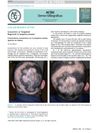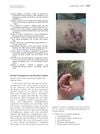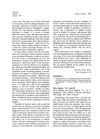 January 2023 in “The Egyptian Journal of Hospital Medicine”
January 2023 in “The Egyptian Journal of Hospital Medicine” New treatments for sudden hair loss include oral medications and a special laser, both showing promise in hair regrowth.
 August 2022 in “IntechOpen eBooks”
August 2022 in “IntechOpen eBooks” The best treatment for Frontal Fibrosing Alopecia and Lichen Planopilaris combines oral and topical medications to reduce symptoms and stop hair loss.
 July 2022 in “Singapore Medical Journal”
July 2022 in “Singapore Medical Journal” Most children with alopecia areata improved with treatment, but those with more hair loss had worse outcomes.
[object Object] January 2022 in “Clinical Cases in Dermatology” A 22-year-old man has alopecia areata, an autoimmune hair loss condition, with various treatments available.
January 2022 in “Clinical Cases in Dermatology” A woman has a permanent hair loss condition treated with steroids and new medicines, but hair might not regrow.

Antimalarial agents are effective for LPP, and intralesional steroids are effective for FFA.
 December 2016 in “Springer eBooks”
December 2016 in “Springer eBooks” A 45-year-old woman with autoimmune diseases experienced patchy hair loss due to alopecia areata, which has no cure but can be treated, with varying success.
 April 2016 in “Actas Dermo-Sifiliográficas”
April 2016 in “Actas Dermo-Sifiliográficas” The document concludes that a unique target-like hair regrowth pattern in alopecia areata may be more common than thought and should be properly identified.
January 2016 in “Çağdaş tıp dergisi” Topical 1% pimecrolimus effectively treated alopecia areata.
 January 2016 in “Springer eBooks”
January 2016 in “Springer eBooks” Alopecia Areata is an unpredictable autoimmune hair loss condition with limited and variable treatment effectiveness.

No treatment alters the natural progression of alopecia areata, and effectiveness varies, with some possibly working better in children.
January 2014 in “European Journal of Dermatology” A method was found to visualize hair regrowth and avoid unnecessary side effects from treatments.
September 2013 in “Canadian Medical Association Journal” Alopecia areata causes sudden hair loss, often resolves within a year, but can recur.
 January 2012 in “Postgraduate obstetrics & gynecology”
January 2012 in “Postgraduate obstetrics & gynecology” Up to 50% of women may experience significant hair loss by age 50, with various causes and treatments available.

A 72-year-old man was diagnosed with a rare skin form of Rosai-Dorfman disease after years of misdiagnosis.
 January 1983 in “Journal of The American Academy of Dermatology”
January 1983 in “Journal of The American Academy of Dermatology” The document suggests improvements for a hair and scalp disease book and recommends a two-volume skin surgery reference for dermatologists.
 16 citations,
June 2015 in “Pediatric dermatology”
16 citations,
June 2015 in “Pediatric dermatology” Lichen Planopilaris in teens is rare, often misdiagnosed, and responds well to steroids.
 February 2024 in “Journal of dermatology”
February 2024 in “Journal of dermatology” CGF therapy may help hair regrowth and improve scars in DLE patients.
 74 citations,
March 2001 in “Seminars in Cutaneous Medicine and Surgery”
74 citations,
March 2001 in “Seminars in Cutaneous Medicine and Surgery” The document concludes that skin biopsies, genetic and environmental factors, and specific treatments are important in managing cutaneous lupus erythematosus.
48 citations,
June 2003 in “Journal of Investigative Dermatology Symposium Proceedings” Contact sensitizers like DCP and SADBE are the most effective treatments for alopecia areata.
 1 citations,
December 2021 in “JAAD case reports”
1 citations,
December 2021 in “JAAD case reports” A woman with severe hair loss saw significant hair regrowth after adding platelet-rich plasma injections to her treatment with tofacitinib.
 5 citations,
January 2021 in “Inflammatory Bowel Diseases”
5 citations,
January 2021 in “Inflammatory Bowel Diseases” Tofacitinib improved ulcerative colitis, skin ulcers, and hair loss in a patient who didn't respond well to other treatments.
 September 2024 in “PubMed”
September 2024 in “PubMed” Hair loss can be treated based on its type and cause, improving quality of life.

Afro-textured hair is more fragile and prone to certain scalp conditions, requiring careful treatment and more research for effective management.
 August 2021 in “Revista Colombiana de Reumatología/Revista Colombiana de Reumatologia”
August 2021 in “Revista Colombiana de Reumatología/Revista Colombiana de Reumatologia” Janus kinase inhibitors may effectively treat severe alopecia areata unresponsive to other treatments.
10 citations,
November 2017 in “Skin Appendage Disorders” Erosive pustular dermatosis in elderly people may be linked to aging immune systems and skin damage.
[object Object]  59 citations,
December 2016 in “Clinical, Cosmetic and Investigational Dermatology”
59 citations,
December 2016 in “Clinical, Cosmetic and Investigational Dermatology” Acne keloidalis nuchae is a tough-to-treat condition that greatly affects quality of life, especially in men of African descent.
 November 2024 in “Journal of Cosmetic Dermatology”
November 2024 in “Journal of Cosmetic Dermatology” Early treatment can reverse hair loss from dermal fillers.

Combining hydroxychloroquine and pimecrolimus can effectively treat hair loss from discoid lupus.
January 2022 in “Clinical Cases in Dermatology” Scalp psoriasis is hard to treat and may need various medications.






















